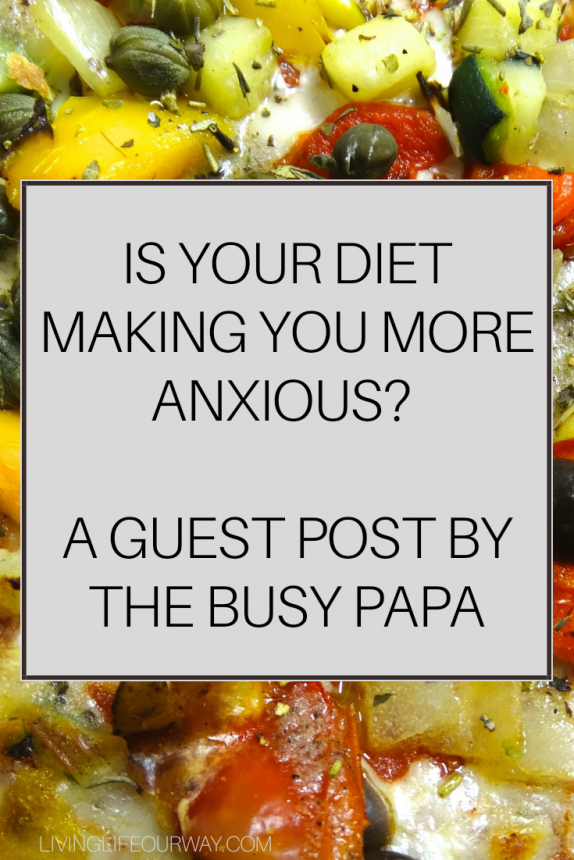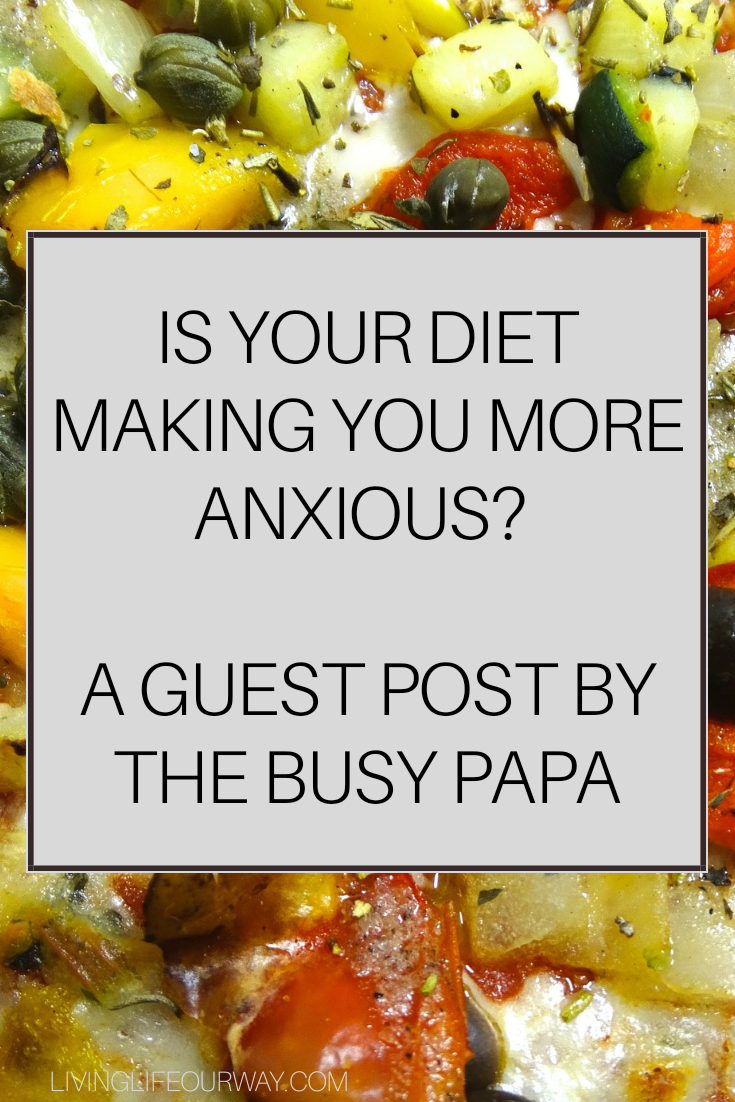The world of nutrition and the physical and mental reactions to what we put in our bodies is a complicated one. Truth be told, humanity is still developing an understanding of this and isn’t quite there yet. What we do know however is that what we digest affects more than just our physical wellbeing. Studies have concluded time and time again that what we put into our bodies affect our mental health as well. As a sufferer of anxiety and stress, this is a topic of great interest to me. If you too are familiar with mental health battles then perhaps there is a question you have also wondered; is your diet making you more anxious?
If you want to find out; keep reading…

Caffeine
The BCA (British Coffee Association) claims that 2 billion cups are consumed each day; making coffee the most popular drink worldwide. The UK is estimated to account for around 95 million of these with 80% of UK households regularly purchasing instant coffee. Other popular sources of caffeine include tea, soft drinks (diet or otherwise), hot chocolate, milk chocolate, dark chocolate and of course energy drinks.
Clearly, caffeine is a foundational part of our diets. This is inherently problematic though as caffeine is a stimulant. Meaning that it triggers hyperarousal otherwise known as the “fight-or-flight response”. This is the same process the body goes through then threatened. Another situation where you might go through this is when under intense stress.
Artificial Sweeteners
Artificial sweeteners are popular due to their lack of calories, perfect for diets and those looking to cut sugar from their lives. However, it isn’t without its issues.
These anti-sugar solutions are serotonin inhibitors; this is the chemical in the brain that regulates anxiety. So, less of it means more symptoms.
The body is an impressive marvel but there are things that it simply cannot break down. An example of this is the chemicals found in artificial sweeteners. Much of the research in this area is still inconclusive but it is widely accepted that hormone levels can be adversely affected by overconsumption and as per caffeine the stress response can be triggered.
Sugar
It’s no secret that sugar has a profoundly negative effect on your physical health. Mental health however is talked about a little less. There is some very clear science to the negative impact though.
When you overindulge in sugar, your body releases insulin to deal with the increase in glucose levels. What this causes is a sugar rush which then leads to a crash. The symptoms of which include decreased focus, drained disposition, nervous behaviour and irritability.
This crash may or may not cause anxiety but what it will certainly do is make existing anxiety worse. Plus, it leads to a difficult cycle where the lack of sugar causes withdrawal symptoms causing stress and yet if succumbed to, the cycle starts over (caffeine of course has a similar effect).
Fruit Juice
The thing with fruit is that it is high in sugar and fruit juices both store bought and produced in a juicer make this issue worse. These drinks concentrate a lot of the sugar from multiple fruits at the expense of the fruit’s fibre. In many cases making the drink no better than a sugar dense drink like Coca-Cola.
This is a reason why I am a big fan of smoothies (which are never exclusively fruit). When juicing; the fibre lost in the process of making a fruit juice means that what you actually lose is a filter that ensures a slow release into your system. The pulp, skin and other fibre goodness is maintained when creating a smoothie through blending. Meaning that you don’t end up with sugar based anxiety, along with confusion as to why you’re being “healthy” and still feel terrible, as with fruit juice.
Processed Foods
When we say processed food, what we mean is food or food-based ingredients that have undergone a process or variety of processes to extend their shelf life or make them easier to mass produce. Most of what we see in supermarkets now fall into this category, but the additives and methods used aren’t always good for us. Lots of time and effort has gone into researching the health implications of diets that are heavily dependent on these food items and truth be told; it isn’t good. Not for our physical or mental health. Progress comes with a cost (as it always has done). The fact is that diets with a higher percentage of fried foods, high in fat dairies (we’ll get to that), overly sweetened treats and processed meat have a higher risk of destabilising moods and causing anxiety and/or depression.
Gluten
Here’s an interesting one; I’ve had a mild gluten intolerance my whole life but (for a number of reasons) I have never made the switch to a Gluten-Free diet. Typical symptoms for Celiac Disease (or gluten intolerance) include indigestion, diarrhoea and dyspepsia. Less common symptoms are depression, anxiety and brain atrophy but studies do show that those with varying degrees of intolerance to gluten are significantly more likely to exhibit these secondary symptoms if not on a GF diet.
Dairy
Dairy is a key component of many of our diets; this is fascinating when you consider that this isn’t a typical or natural dietary staple. Now, obviously mammals of all shapes and sizes take milk but what I mean by this is that you wont see milk being consumed into adulthood in other species, nor cross species consumption of said milk. I’m not an expert, so I can’t be sure that there aren’t exceptions but generally this is true.
Lactose intolerant or not; dairy puts stress on the body. It inflates various parts of the digestive system causing a number of gastric issues. This stress will in turn cause anxiety.
Salt
Salt has a benefit in your diet but only in moderation. In terms of mental health; too much salt can have a neurological impact resulting in restlessness, compromised immune system functionality or inability to sleep (which is incredibly detrimental to mental health).
Alcohol
It is funny isn’t it? We talk about having a drink to steady the nerves but in reality it is a little more complicated. Yes, alcohol sedates and relaxes but it also impacts serotonin levels. This means that too much of it can completely mess up your brain chemistry. So, what happens is that as the sedative wears off, withdrawal kicks in causing depression and anxiety symptoms. So, the solution is to drink more and get caught in a cycle or to endure it. If you already are struggling with anxieties or are down then this will only exasperate that.
Conclusion
It should be clear that a lot of foundational components of the modern western diet have mental health implications (if consumed without consideration). The lesson here is not that nothing is safe to eat and drink but rather, that what you do eat and drink should be done so in an informed and responsible way.
Finally, I want to make clear that diet is a factor that can aid or hinder anxiety levels. It is not the root cause, nor the cure. What we’re talking about is a factor that impacts the brain chemical balance at any given time, but not a solution to your overall feelings or life situation. Equally, it is not a replacement to medication and/ or therapy if you suffer from Generalised Anxiety Disorder (GAD). Diet is just another thing to be aware of; not the cause or solution. And, as always, if it persists, nothing is more important than taking some time to speak to your doctor.
Author Bio
Also known as Aaron, The Busy Papa focuses on lifestyle, parenting and personal wellbeing content. He has two decades experience in creative writing (including several published poems) and strongly dislikes (though tolerates) tomatoes.
You can find his blog over at The Busy Papa and he is on facebook, twitter and instagram too.

